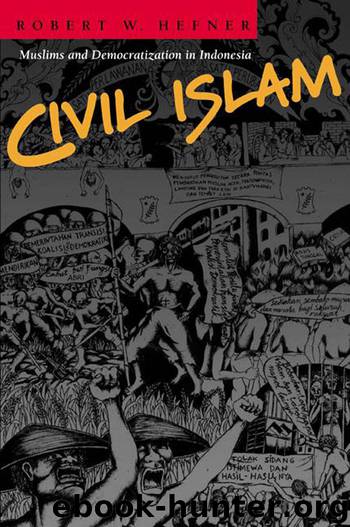Civil Islam by Hefner Robert W.; Hefner Robert W. W.;

Author:Hefner, Robert W.; Hefner, Robert W. W.;
Language: eng
Format: epub
Publisher: Princeton University Press
Muslim Intellectuals and the Public Sphere
If bureaucrats constituted the largest and most powerful of ICMI’s sub-groupings, they never controlled all aspects of the organization. In fact, as far as many in the media and Muslim community were concerned, the “real” membership of ICMI consisted not of government bureaucrats but of the organization’s two other groupings: Muslim intellectuals, including many of a civil democratic complexion, and activists interested in using ICMI to promote political change. These two groups were not mutually exclusive; many people combined the roles of scholars and activists. Complicating matters further, each subgroup was not ideologically unified, least of all in their attitude toward Soeharto. Some in each subgrouping were pro-Soeharto; others were not.
In terms of their numbers, the independent intellectuals were the smallest of ICMI’s three core constituencies. Nonetheless their moral influence in ICMI and the Muslim public at large was the greatest. The single most influential figure in this group was Nurcholish Madjid, the former student leader who, in the 1970s, had gone on to promote a civil-democratic vision of Islam that had great appeal in the new Muslim middle class (chapter 5). In some accounts17 Madjid is thought to have played a minor role in ICMI’s establishment, and then distanced himself from the organization after 1993 as ICMI was drawn into elite politics. But Madjid himself views his role otherwise. Yes, he told me during our annual meetings between 1991 and 1998, he liked to keep his distance from the bureaucrats and regime-oriented ICMI activists. While criticizing ICMI’s politicization, however, Madjid remained a key player in the organization until the overthrow of Soeharto in May 1998. It was Madjid, after all, who drafted the document in mid-1990 that outlined ICMI’s goals and organizational structure. And it was Madjid more than any other person who regularly intervened to protect reform-minded activists when their actions provoked regime censure. Madjid was unstinting in his criticisms of those who would reduce ICMI to a vehicle of Habibie ambition. But he never severed his ties with the organization because he recognized that the bureaucrats and regime activists were not its whole. Much of the public agreed with Madjid, and regarded him, not Habibie, as the organization’s spiritual leader.
Madjid was convinced that most of the Muslim middle class believed, with him, that Islam must influence politics and public life, but in a way that rejects the subordination of high principles to regimist ploys. Long before Amien Rais (the Muhammadiyah leader) popularized the phrase, Madjid’s was a “high politics” of political civility and principled pluralism. In 1991–92, as conservatives were mobilizing to use ICMI against Christians and “nationalists” in the bureaucracy, Madjid made repeated appeals for inter-religious tolerance. In a celebrated and courageous presentation on October 21, 1992, he insisted that the Qur’an was revealed to confirm and protect the truth of prior revelations, especially but not exclusively those of Judaism and Christianity.18 This meant that the details of these other revelations were still valid except if explicitly abrogated by the Qur’an.
Download
This site does not store any files on its server. We only index and link to content provided by other sites. Please contact the content providers to delete copyright contents if any and email us, we'll remove relevant links or contents immediately.
| Anarchism | Communism & Socialism |
| Conservatism & Liberalism | Democracy |
| Fascism | Libertarianism |
| Nationalism | Radicalism |
| Utopian |
The Secret History by Donna Tartt(18188)
The Social Justice Warrior Handbook by Lisa De Pasquale(11957)
Thirteen Reasons Why by Jay Asher(8461)
This Is How You Lose Her by Junot Diaz(6452)
Weapons of Math Destruction by Cathy O'Neil(5842)
Zero to One by Peter Thiel(5498)
Beartown by Fredrik Backman(5369)
The Myth of the Strong Leader by Archie Brown(5243)
The Fire Next Time by James Baldwin(5024)
How Democracies Die by Steven Levitsky & Daniel Ziblatt(4966)
Promise Me, Dad by Joe Biden(4912)
Stone's Rules by Roger Stone(4867)
100 Deadly Skills by Clint Emerson(4695)
A Higher Loyalty: Truth, Lies, and Leadership by James Comey(4557)
Rise and Kill First by Ronen Bergman(4548)
Secrecy World by Jake Bernstein(4394)
The David Icke Guide to the Global Conspiracy (and how to end it) by David Icke(4386)
The Farm by Tom Rob Smith(4329)
The Doomsday Machine by Daniel Ellsberg(4250)
